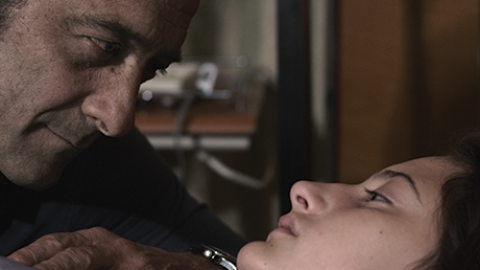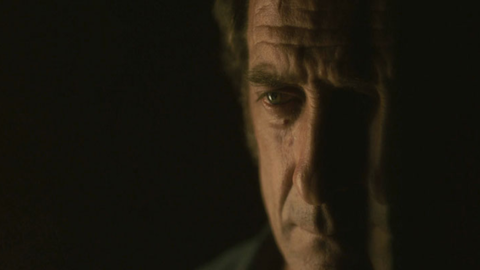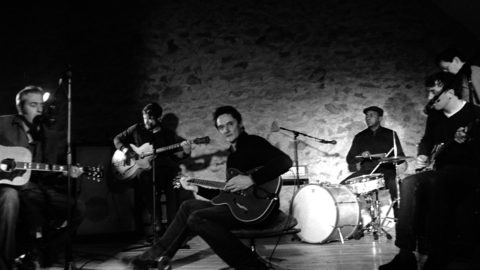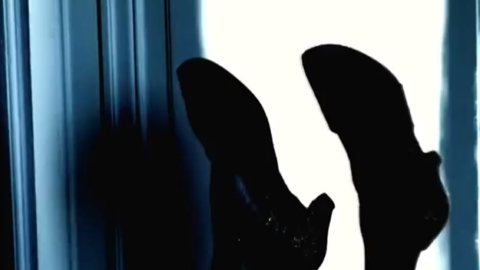Interview: Claire Denis
An almost-ritualistic scene of unconscionable violation and betrayed trust concludes Bastards, the eleventh fiction feature (opening October 23) by Claire Denis. At a press and industry screening for the film at the 51st New York Film Festival, the credits rolled for a quiet house—but perhaps the most shocking aspect of this solemn scene was that it didn’t exist specifically to shock or provoke or bid for succès de scandale, any more than the affront of a title. Both are instead determined by necessity, a desire to get to the heart of matters—the seemingly inevitable conclusion bringing together the film’s various narrative strands, each of which is concerned with destructive family allegiance. The outrage is essential—and Denis, in a filmography defined by restless fracturing and reconfiguring, has for 25 years been making some of the most outrageous and essential narrative cinema.
Denis’s father was a French colonial administrator, and she was raised in Africa until she was twelve years old. She began her career in cinema by entering IDHEC, the premiere French film school, in 1971. Subsequently, Denis was an extra on Bresson’s Four Nights of a Dreamer, observed figures like Jacques Rivette and Dušan Makavejev at work and, in the Eighties, rose to the ranks of first assistant director, in which capacity she was employed by both Wim Wenders and Jim Jarmusch. Drawing from memories of her girlhood in Africa, Denis made her directorial debut in 1988 with Chocolat, a distinctive, lyrical film which only hinted at the radical experiments in narrative to come. Chocolat was also Denis’s first collaboration with both DP Agnès Godard and actor Isaach de Bankolé, who would each become part of a rotating group of Denis collaborators that would return to the fold from film to film. Others include the Nottingham-based group Tindersticks, actors Alex Descas, Michel Subor, and Vincent Gallo—and now Vincent Lindon, previously the star of 2002’s Friday Night, returning to appear in Denis’ Bastards.
In Bastards, Lindon plays Marco Silvestri, a career sailor who leaves the sea to confront a family crisis in Paris at the behest of his sister, Sandra (Julie Bataille). The shoe business which Marco forsook his share of is foundering; her husband, Marco’s brother-in-law (Laurent Grévill), has committed suicide; her daughter, Marco’s niece (Lola Créton), has been hospitalized for drug abuse and sexual trauma. Sandra blames Edouard Laporte (Subor), a wealthy financier to whom the Silvestri family has become beholden in their debt, for all of this. Marco accordingly takes in apartment in the building where Laporte’s mistress, Raphaëlle (Chiara Mastroianni), lives with his son, though his investigation will reveal that his own kin were not so innocent in their undoing.
The Monday after Bastards had screened for the public—and after “Claire Denis” had briefly, improbably become a trending topic on Twitter—I sat down with Denis in an empty auditorium at Lincoln Center’s Elinor Bunin Munroe Film Center. After wrapping a scarf around her head, babushka-style (“I hate air conditioning…”), the diminutive Denis, one of the great gunslingers of contemporary cinema, aided this interlocutor in unpacking Bastards.

Bastards
Where did the kernel of the idea for Bastards come from, whether an image or a scene or a character?
From the idea of working with Vincent Lindon once more, and that something in him, as he’s reaching his fifties, remind me so much of Toshiro Mifune in Kurosawa’s noir films in the 1950s—High and Low or The Bad Sleep Well. This kind of solid guy you can trust, you can lean on… He’s mastering everything he is doing, and yet he becomes a victim. I thought Vincent was so much someone like that for me. His body, his face, his generosity. When he drives a car he drives a car, when he washes the dishes, he washes the dishes. There is something so pure in him, so I thought he would be a great sailor.
How did you start to build out from that initial idea?
Maybe someone is calling for help—his little sister? And of course she’s hiding half the truth. And little by little he’s mingling with something he would never imagine. Probably he was right when he decided not to work in the family company and went to the Navy. He knew it was better for him to be far away…

Beau Travail
When we first encounter Lindon’s character, Marco, he’s cut himself off, a bit like the foreign legionnaires in Beau Travail [99]…
To escape the quotidian life, yes it’s true. Completely. Me, I wish I could be a sailor or soldier, so many times. And to have a family at home dealing with all the problems, water leaks, paying the bills…
He’s out at sea, and it’s such a white, pure, immaculate sea.
It’s a beautiful place, it’s Fujairah, near Dubai. I wanted him to be far. I wrote in the script that he is in the Indian Ocean which, for me… France is so far away, how could he care? And then we found this oil harbor near Dubai, Fujairah, which is actually the biggest oil reserve for tankers in the Arabic Peninsula, it’s very impressive.
Leaving behind this pristine sea, when Marco gets on land, it’s comparatively very soiled. There’s a touch of Conrad there.
Yeah, yeah. Conrad was not in my mind, but Conrad, he knows exactly what it is to be at sea and to have to land for family reasons, you know? It’s something that everyone who read Conrad… It’s like shooting a film, when you’re in the middle of a film you have no problems, no family problems, no tax problems, no washing machine problems, you don’t need a plumber.
In lieu of going to sea then, you can make films?
No, I don’t think making films is as strong as being a sailor… It’s slightly fake sailing.

Bastards
There are some sensationalistic aspects to the plot of Bastards, though they’re not treated in a sensationalistic fashion. Was there any particular headline or any news item that you were drawing from in this rather contemporary story?
No, I don’t think it’s contemporary. It’s already well, well treated in the Greek tragedy, and in the Bible. I was amazed sometimes by certain… on TV news channels, with 24 hours to fill, you can see terrible stories on TV all the time, and you understand that it happened not in a gang, but the most horrible things happen inside a family. A daughter is kept in a cave by her father and she has six children from her father… This is not new, of course. It exists, probably, since the first human. But it’s becoming the material of vulgar fiction, where for the Greeks it was a metaphor of the human condition. Now it’s become vulgar material, like this… [Pats the pleather sofa we’re sitting on.]
Or like the round, naugahyde bed in the porno studio in Bastards… You’d said that you’d attempted a different writing process in this movie—how was it different?
Because I started with Vincent Lindon in mind, and the idea of the density of a Kurosawa movie, his so-called noirs… And I told Jean-Pol [Fargeau], my colleague that I would love to, instead of going into circles, to proceed block by block, not knowing anything more than Marco knows, than is revealed to him.
When Marco moves in on the top floor, above Chiara Mastroianni’s Raphaëlle, does he knows his game plan?
He’s looking for revenge because his sister told him to, but he doesn’t know why, what happened between his niece and his brother-in-law.
It’s a question of “Keep your enemies closer,” getting a crow’s-nest vantage point. Does he know exactly what he’s going to do, though?
No, no, he doesn’t, he hasn’t seen the lawyer yet, he knows very little. His sister’s just told him that his brother-in-law has been betrayed and mistreated by this horrible rich guy, [Michel] Subor’s character, Laporte, that’s all. And it’s only when the doctor tells him what happened to his niece, physically, and when the lawyer explains the relationship between Laporte and his brother-in-law, that suddenly Marco starts to understand some piece of it, and he could decide for revenge, but he doesn’t know the whole truth, because he’s still putting things together.
I was mystified by the scene where we see Raphaëlle recovering her son’s bike in the woods. It seems like an omen of something to come, which never comes to pass…
That preceded by Marco in bed, and Raphaëlle’s upstairs. She wants to knock on his door but she doesn’t dare, but he can hear her because she’s just outside. He’s switched off the lights and is lying down… and he’s daydreaming of revenge, of kidnapping the kid. He’s imagining hurting her through the kid.

Bastards
This is your first film shot on digital. Was this something that your hand was forced on, because of budget and industrywide changes?
No… I was really eager to start. I wanted to start with White Material [09] but then I discovered that something was wrong… I didn’t like the quality, the way that digital at that time described heat. The depth of field when it’s very hot, it’s very special, and I thought I could only get that with a slow film. And I didn’t like the way that Isabelle… the white people photographed pinkish. So I postponed starting with digital. But with Bastards, which is northern and cold, I decided it was a good moment for me to use a digital camera, and then we chose the RED Epic. We found it very difficult… We had to adapt ourselves not to try to pretend it will look like film. It was difficult also because this camera sees everything, and to create this obscure, cave-like atmosphere inside the apartment, like a tomb… to make it very obscure was a difficult thing, we had to use a lot of lights.
You and your DP Agnès Godard always assign the couple of lenses that you’re going to use before you start, try to map out the film’s visual identity.
We always do. We shot tests in the factory and in the apartment, and with the actors, I wanted to see their skin in a certain light.
So much of the movie is in skin textures.
I wanted to have all the women dark-haired, Mediterranean. It was very important for me to have no blondes, because I didn’t want to have that shine. Everything had to be Mediterranean, tragic.

Bastards
Where did Julie Bataille, who plays Marco’s sister, come from?
I like her face, she’s like a little Venetian woman. I saw her on TV, she was a cop on a TV series, and I thought she was great. She looks like a little Picasso.
In her close-ups she’s always practically pressed up against the camera.
“Pressed up” is a bad word. It sounds painful. I never press a face. She’s filling the screen. Everything relies on her.
You’ve said before that it’s important for you to create fresh complications in every movie…
This is between Agnès and me. This is not in the script. This is something that Agnès and me will try, we try not to reproduce something that we have been doing because we know that we work together so well, our relationship is so great that we can test things we would never test with another person. But it’s not in the film itself, it’s between Agnès and me. We try never to reproduce an image we have made already. It’s not to make something new, no there’s nothing new… But it’s to experience filmmaking differently each time in our work together.
But at the same time you’re trying to create this new experience, you have a group of familiar collaborators who are almost family at this point…
It’s not a family. It’s people I like and they trust me, maybe they like me too. It’s like in a circus, you’re not afraid to do a triple jump if you know everyone and can count on them. You cannot do it if you know no-one. But family is very different. The film is about that.
Collaborators, not family. With Tindersticks’ soundtrack, what kind of suggestions or instructions did you give?
No instructions. I would never dare to give instructions to Stuart [Staples, Tindersticks frontman]. He understands films so well, he’s such a collaborator, he’s not only there to add music on the film… He’s probably the first person to understand the movie.
Do you worry that the song at the end, gloomy but almost slinky, will mitigate the power or the horror of the images?
On the contrary, I think it’s great. And it’s not slinky the way that Stuart sings it. Maybe the Hot Chocolate version, but not the way Stuart sings it. It’s like a scream in a way. And if people don’t like it, it’s their problem.

35 Shots of Rum
To digress back to family, it’s interesting to contrast Bastards to 35 Shots of Rum [35 Rhums, 08], a very tender film about family ties. Bastards is almost the negative image of 35 Shots of Rum.
Sure. Family is the worst and the best. But 35 Rhums is also sad, because these two people, the father and daughter, they wish not to be separated, and they have to. So it’s sad.
Have you felt a push-pull with regards to family yourself?
No, no, no.
What about that desire to go off to sea?
I did run away from my family when I was… I got married when I was very young, to get rid of the family, because I was the oldest, and I wanted to be away, free, doing what I wanted. But it was not… It was okay. My family comes from such different origins that it was easy to, at one point, be part of them completely again. But it’s good to run away at a certain point. In the case of 35 Rhums, it’s not me, it’s the story of my mother and my grandfather. He once had to push my mother away, because he was afraid she might stay for him, and he wanted her to have a life.
There’s a tossed off scene early on in Bastards which seems to me the key to the movie, where the relative of the concierge is there helping out while she’s sick, and he says to Raphaëlle…
“It’s normal, it’s family.” C’est la famille. Everyone says that family is something you can lean on, but it’s also the most painful thing in the world.
You play all of these variations on the theme of family loyalty, and then finally you run us smack into the wall which is the closing images of incest, as though to say this is what lies at the heart of family loyalty.
The first taboo is incest, because it’s not good for society. It’s the origin of the law, the creation of society. To create a society that is rich and that has protective patrimonium, to protect the health of the people, you have to avoid incest. It’s probably the first law that was invented on earth. But if it was the first law…

Bastards
If it wasn’t a temptation, you wouldn’t need a law.
Of course, of course. It’s everywhere. Not in every family, but the temptation you know… When I was a child and I was reading the Bible and I was not understanding all those hints towards incest. But there is no judgment here. Filmmaking is an intuition, it’s like a sound, it’s a hint, a color, a movement. It’s not there to teach people.
You’ve spoken about the fact that Faulkner was somewhere in the conception of Bastards…
Faulkner is never somewhere, he’s everywhere with me. He introduced me to new way of reading, to a new way of understanding literature, which expanded my imagination so much. He’s a man of the South, and I was growing up in Africa, so we have some understanding in common.
From the title on down, Bastards deals with lineage, bloodlines, which is very much present in Faulkner, the idea that you’re not just yourself, but your forebears…
Alex Descas plays the doctor to the Silvestri family. It’s important that the doctor is a black guy, he’s watching all of that from a distance. This is very Faulknerian. He has a sense of watching, but he doesn’t want to do too much.
And it’s he who Marco’s sister asks to bear witness at the end.
She doesn’t want to watch those images alone.
As the movie progresses, Marco comes to believe that his bloodline is tainted, cursed. Do you believe such tainted strains exist?
I believe someone could believe that. I believe I could believe that. I believe a person could believe that. But I don’t believe it’s really true.







